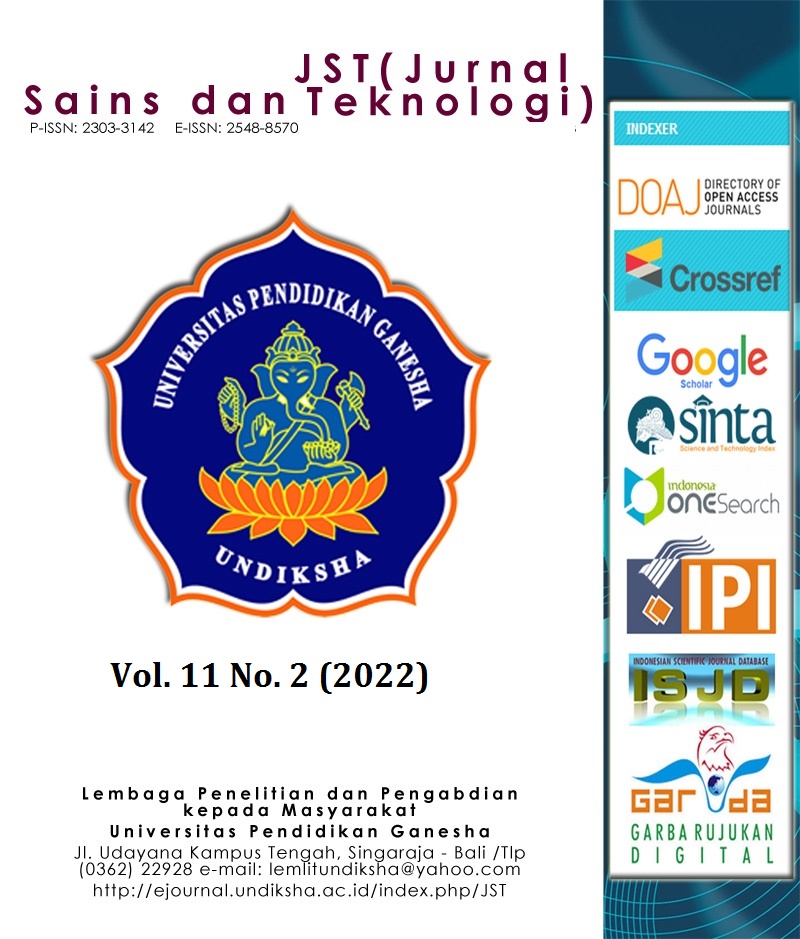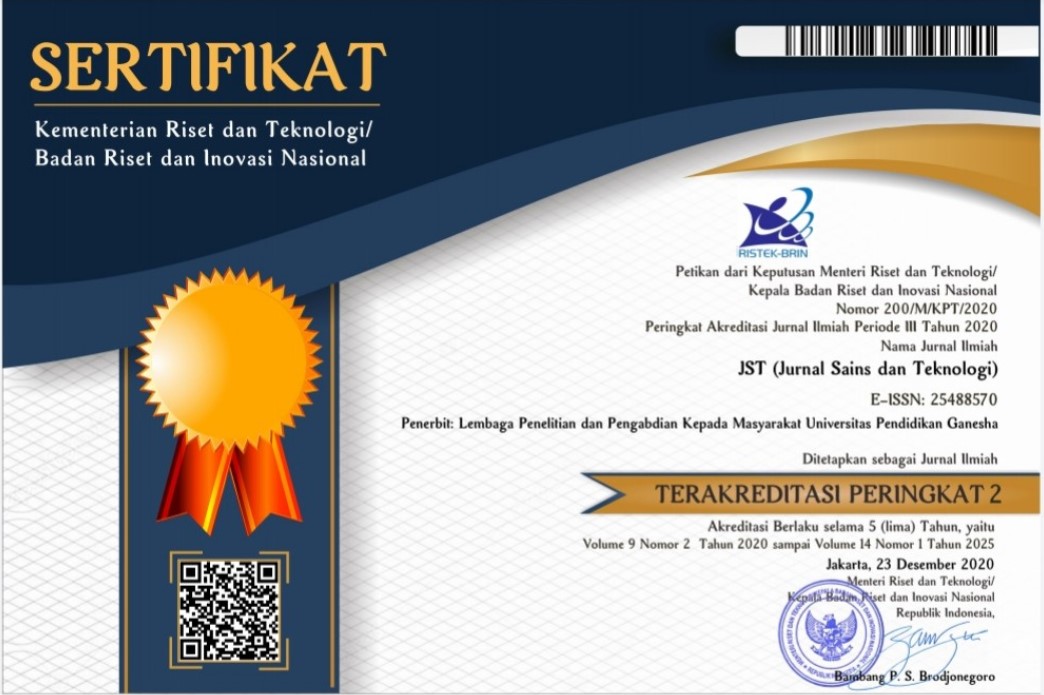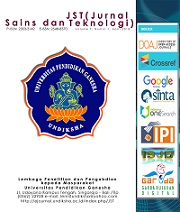Adaptation of Information Systems Strategic Planning of Universities Using COBIT 2019 in Post Covid-19
DOI:
https://doi.org/10.23887/jstundiksha.v11i2.48365Kata Kunci:
COVID-19, Universities, Strategic Planning, Ward & Peppard, COBIT 2019Abstrak
COVID-19 has changed universities in managing processes and services with more relevant systems. This is a challenge for universities to design strategies both during and after this pandemic ends. This study aims to apply the methodology and design principles of COBIT 2019 to adapt the operational model and strategic planning of higher education institutions in the post-pandemic period. The COVID-19 challenge has shown that digital information systems are a critical factor in ensuring robust business processes. This study uses Syarif Hidayatullah State Islamic University Jakarta as a case study, the results of calculation of institutional capability level are currently in the range of level 3 with desired capability level target being level 4, this means that governance in the agency has been carried out according to plan but is not ready to implement fully used after the pandemic. This research produces several that are useful as the best adaptation in the New Normal era.
Referensi
Abidin, N., & Samopa, F. (2016). Perencanaan Strategis Si/Ti Di Perguruan Tinggi Menggunakan Cobit 5 Dan Ward and Peppard (Studi Kasus: Universitas Airlangga). Sisfo, 5(5), 612–629. https://doi.org/10.24089/j.sisfo.2016.03.012.
Agarwal, S., & Dewan, J. (2020). An Analysis of the Effectiveness of Online Learning in Colleges of Uttar Pradesh during the COVID 19 Lockdown Page No : 2957. Journal of Xi’an University of Architecture & Technology, XII(V), 2957–2963.
Ahrens, A., & Zascerinska, J. (2021). Post-Covid-19 University Governance in Germany. Education Reform: Education Content Research and Implementation Problems, 2(February 2021), 7–16. https://doi.org/10.17770/er2020.2.5336.
Aristovnik, A., Keržič, D., Ravšelj, D., Tomaževič, N., & Umek, L. (2020). Impacts of the COVID-19 pandemic on life of higher education students: A global perspective. Sustainability (Switzerland), 12(20), 1–34. https://doi.org/10.3390/su12208438.
Arvidsson, V., Holmström, J., & Lyytinen, K. (2014). Information systems use as strategy practice: A multi-dimensional view of strategic information system implementation and use. The Journal of Strategic Information Systems, 23(1), 45–61. https://doi.org/10.1016/j.jsis.2014.01.004.
Basri, K. H., & Suryani, E. (2018). Strategic Planning Information System for Improving Quality of Datu Sanggul Hospital in Rantau. IPTEK Journal of Proceedings Series, 4(1), 142. https://doi.org/10.12962/j23546026.y2018i1.3526.
Bernroider, E. W., & Ivanov, M. (2011). IT project management control and the Control Objectives for IT and related Technology (CobiT) framework. International Journal of Project Management, 29(3), 325–336. https://doi.org/10.1016/j.ijproman.2010.03.002.
Ceesay, E. K. (2021). Potential impact of COVID-19 outbreaks on education, staff development and training in Africa. Research in Globalization, 3, 100049. https://doi.org/10.1016/j.resglo.2021.100049.
Chaturvedi, K., Vishwakarma, D. K., & Singh, N. (2021). COVID-19 and its impact on education, social life and mental health of students: A survey. Children and Youth Services Review, 121. https://doi.org/10.1016/j.childyouth.2020.105866.
Deepa, V., Sujatha, R., & Mohan, J. (2022). Unsung voices of technology in school education-findings using the constructivist grounded theory approach. Smart Learning Environments, 9(1), 1–25. https://doi.org/10.1186/s40561-021-00182-7.
Donthu, N., & Gustafsson, A. (2020). Effects of COVID-19 on business and research. Journal of Business Research, 117(June), 284–289. https://doi.org/10.1016/j.jbusres.2020.06.008.
Harwikarya, Sadikin, M., Fitrianah, D., Sarinanto, M. M., Nurhaida, I., & Dwiyanto, A. R. (2015). IS Strategic Plan for Higher Education Based on COBIT Assessment: A Case Study. International Journal of Information and Education Technology, 5(8), 629–633. https://doi.org/10.7763/ijiet.2015.v5.581.
Ishlahuddin, A., Handayani, P. W., Hammi, K., & Azzahro, F. (2020). Analysing IT Governance Maturity Level using COBIT 2019 Framework: A Case Study of Small Size Higher Education Institute (XYZ-edu). 3rd International Conference on Computer and Informatics Engineering, 236–241. https://doi.org/10.1109/IC2IE50715.2020.9274599.
Joshi, A., Bollen, L., Hassink, H., De Haes, S., & Van Grembergen, W. (2018). Explaining IT governance disclosure through the constructs of IT governance maturity and IT strategic role. Information and Management, 55(3), 368–380. https://doi.org/10.1016/j.im.2017.09.003.
Malan, M. (2020). Engaging students in a fully online accounting degree: an action research study. Accounting Education, 0(0), 321–339. https://doi.org/10.1080/09639284.2020.1787855.
Nash, M., & Churchill, B. (2020). Caring during COVID-19: A gendered analysis of Australian university responses to managing remote working and caring responsibilities. Gender, Work and Organization, 27(5), 833–846. https://doi.org/10.1111/gwao.12484.
Odriozola-González, P., Planchuelo-Gómez, Á., Irurtia, M. J., & de Luis-García, R. (2020). Psychological effects of the COVID-19 outbreak and lockdown among students and workers of a Spanish university. Psychiatry Research, 290. https://doi.org/10.1016/j.psychres.2020.113108.
Onyema, E. M. (2020). Impact of Coronavirus Pandemic on Education. Journal of Education and Practice, 11(13), 108–121. https://doi.org/10.7176/jep/11-13-12.
Panesar, K., Dodson, T., Lynch, J., Bryson-Cahn, C., Chew, L., & Dillon, J. (2020). Evolution of COVID-19 Guidelines for University of Washington Oral and Maxillofacial Surgery Patient Care. Journal of Oral and Maxillofacial Surgery, 78(7), 1136–1146. https://doi.org/10.1016/j.joms.2020.04.034.
Peppard, J., & Ward, J. (2004). Beyond strategic information systems: Towards an IS capability. Journal of Strategic Information Systems, 13(2), 167–194. https://doi.org/10.1016/j.jsis.2004.02.002.
Prasetyanto, D., Rizki, M., & Sunitiyoso, Y. (2022). Online Learning Participation Intention after COVID-19 Pandemic in Indonesia: Do Students Still Make Trips for Online Class? Sustainability (Switzerland), 14(4). https://doi.org/10.3390/su14041982.
Prawiyogi, A. G., & Anwar, S. A. (2021). Stages of Using Ward and Peppard Methods in Information System Strategic Planning. ADI Journal on Recent Innovation (AJRI), 3(1), 78–86. https://doi.org/10.34306/ajri.v3i1.535.
Sinha, D., Bagodi, V., & Dey, D. (2020). The Supply Chain Disruption Framework Post COVID-19: A System Dynamics Model. Foreign Trade Review, 55(4), 511–534. https://doi.org/10.1177/0015732520947904.
Wulandari, S. A., Dewi, A. P., Rizki Pohan, M., Sensuse, D. I., Mishbah, M., & Syamsudin. (2019). Risk assessment and recommendation strategy based on COBIT 5 for risk: Case study sikn Jikn helpdesk service. Procedia Computer Science, 161, 168–177. https://doi.org/10.1016/j.procs.2019.11.112.
Yin, H. (2022). Empowering Student Learning in Higher Education: Pathways to Possibility. ECNU Review of Education, 1–6. https://doi.org/10.1177/20965311211073971.
Unduhan
Diterbitkan
Cara Mengutip
Terbitan
Bagian
Lisensi
Hak Cipta (c) 2022 Abdurrahman Harits, Rahmat Gernowo, Djatmiko Endro Suseno

Artikel ini berlisensiCreative Commons Attribution-ShareAlike 4.0 International License.
Authors who publish with the Jurnal Sains dan Teknologi (JST) agree to the following terms:
- Authors retain copyright and grant the journal the right of first publication with the work simultaneously licensed under a Creative Commons Attribution License (CC BY-SA 4.0) that allows others to share the work with an acknowledgment of the work's authorship and initial publication in this journal.
- Authors are able to enter into separate, additional contractual arrangements for the non-exclusive distribution of the journal's published version of the work (e.g., post it to an institutional repository or publish it in a book), with an acknowledgment of its initial publication in this journal.
- Authors are permitted and encouraged to post their work online (e.g., in institutional repositories or on their website) prior to and during the submission process, as it can lead to productive exchanges, as well as earlier and greater citation of published work. (See The Effect of Open Access)
















